Analysis of Australian Mental Health and Disability Policies
VerifiedAdded on 2022/08/22
|8
|1917
|14
Report
AI Summary
This report provides a policy analysis of mental health and disability in Australia, focusing on three key policies: the National Mental Health Policy 2008, the National Disability Policy (2010-2020), and the NSW Aboriginal Mental Health and Well Being Policy 2006-2010. The analysis examines the roles of these policies, their overarching intentions, and their impacts on supporting individuals with mental health issues and/or disabilities, including the Aboriginal population. The report highlights the policies' effectiveness in promoting mental health, early intervention, and access to care, while also acknowledging limitations and areas for improvement. The discussion covers the policies' influence on social work practice, the importance of addressing stigma and discrimination, and the impact on patients and their carers. The report emphasizes the need for culturally sensitive and holistic approaches to mental health care, particularly for vulnerable populations. The conclusion summarizes the key findings and emphasizes the importance of comprehensive policies in addressing mental health challenges and promoting wellbeing.
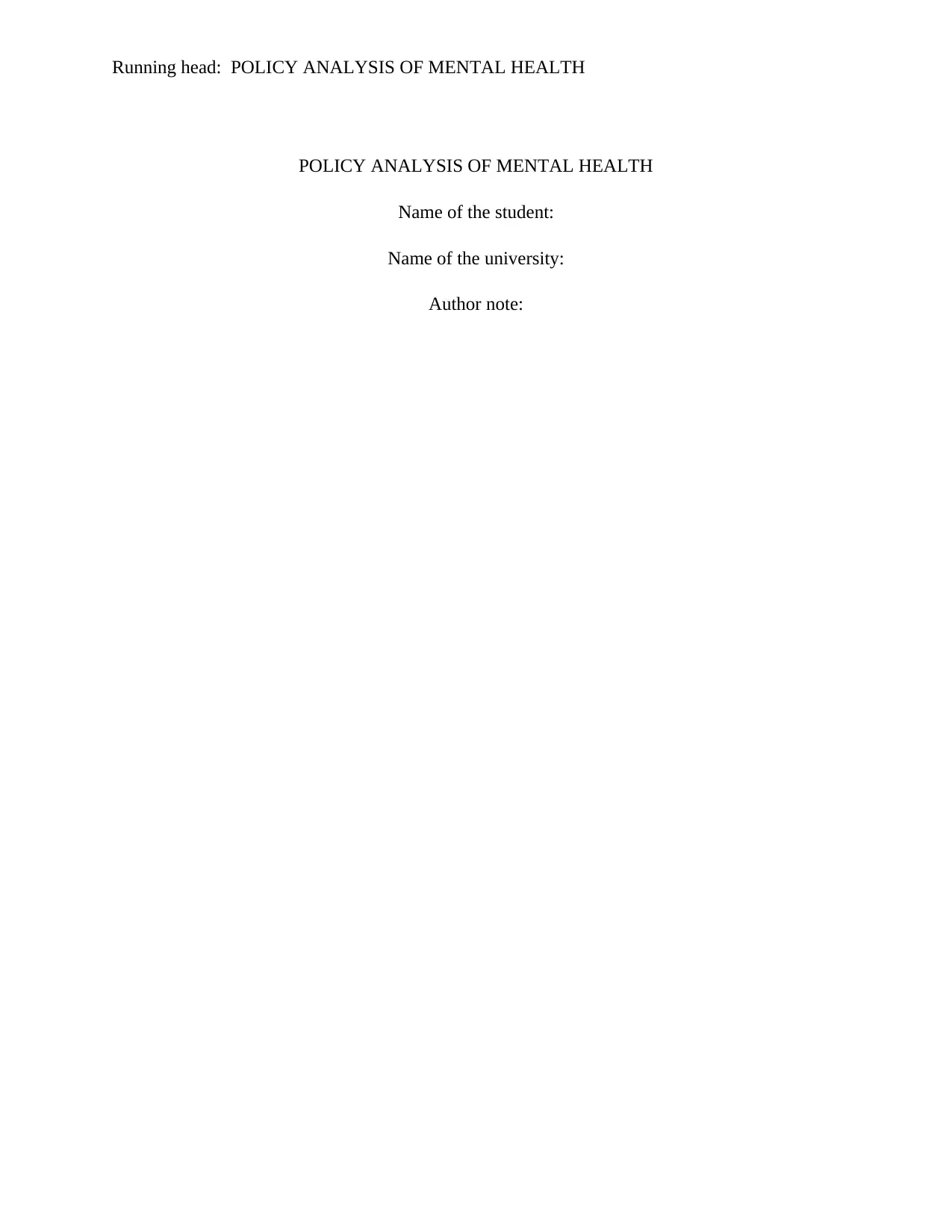
Running head: POLICY ANALYSIS OF MENTAL HEALTH
POLICY ANALYSIS OF MENTAL HEALTH
Name of the student:
Name of the university:
Author note:
POLICY ANALYSIS OF MENTAL HEALTH
Name of the student:
Name of the university:
Author note:
Paraphrase This Document
Need a fresh take? Get an instant paraphrase of this document with our AI Paraphraser
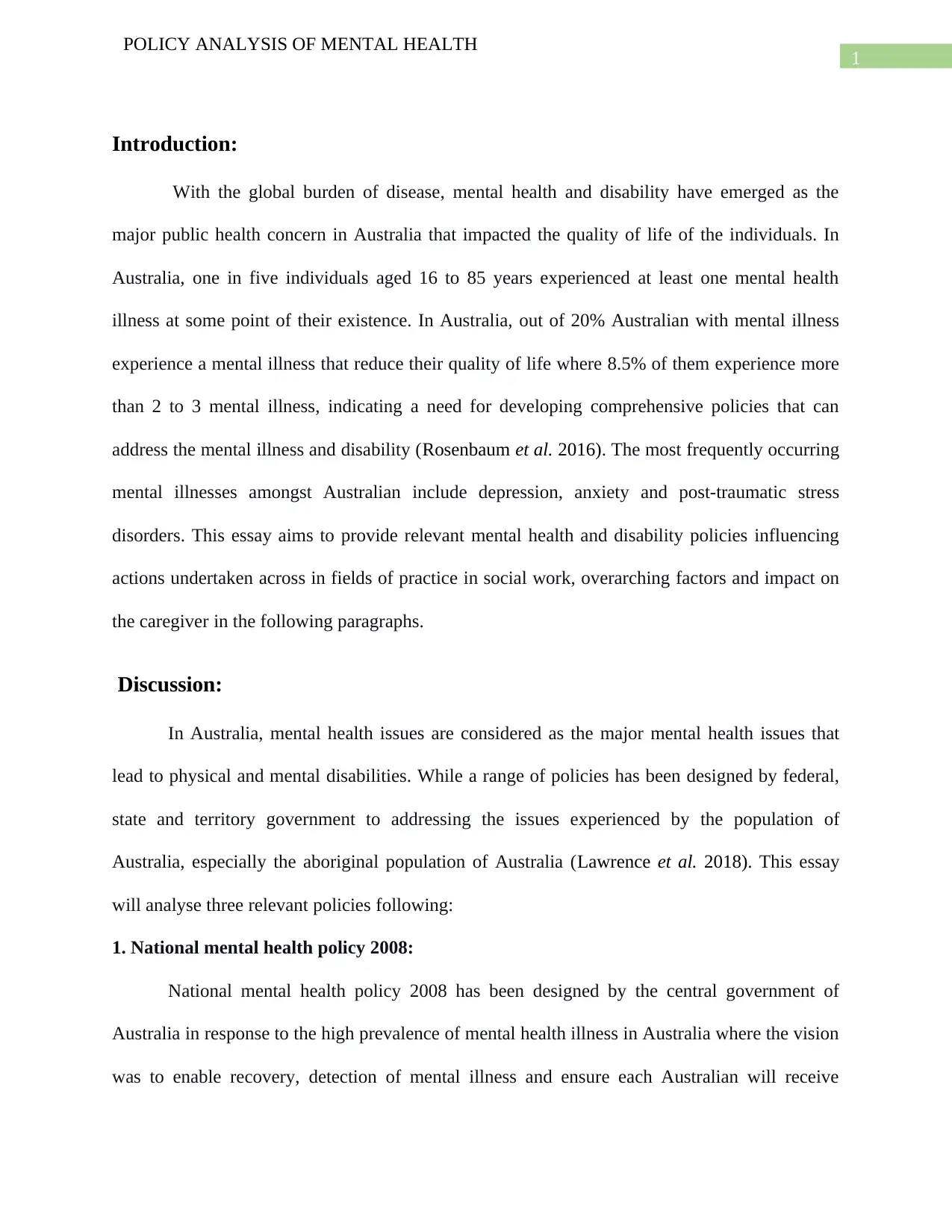
1
POLICY ANALYSIS OF MENTAL HEALTH
Introduction:
With the global burden of disease, mental health and disability have emerged as the
major public health concern in Australia that impacted the quality of life of the individuals. In
Australia, one in five individuals aged 16 to 85 years experienced at least one mental health
illness at some point of their existence. In Australia, out of 20% Australian with mental illness
experience a mental illness that reduce their quality of life where 8.5% of them experience more
than 2 to 3 mental illness, indicating a need for developing comprehensive policies that can
address the mental illness and disability (Rosenbaum et al. 2016). The most frequently occurring
mental illnesses amongst Australian include depression, anxiety and post-traumatic stress
disorders. This essay aims to provide relevant mental health and disability policies influencing
actions undertaken across in fields of practice in social work, overarching factors and impact on
the caregiver in the following paragraphs.
Discussion:
In Australia, mental health issues are considered as the major mental health issues that
lead to physical and mental disabilities. While a range of policies has been designed by federal,
state and territory government to addressing the issues experienced by the population of
Australia, especially the aboriginal population of Australia (Lawrence et al. 2018). This essay
will analyse three relevant policies following:
1. National mental health policy 2008:
National mental health policy 2008 has been designed by the central government of
Australia in response to the high prevalence of mental health illness in Australia where the vision
was to enable recovery, detection of mental illness and ensure each Australian will receive
POLICY ANALYSIS OF MENTAL HEALTH
Introduction:
With the global burden of disease, mental health and disability have emerged as the
major public health concern in Australia that impacted the quality of life of the individuals. In
Australia, one in five individuals aged 16 to 85 years experienced at least one mental health
illness at some point of their existence. In Australia, out of 20% Australian with mental illness
experience a mental illness that reduce their quality of life where 8.5% of them experience more
than 2 to 3 mental illness, indicating a need for developing comprehensive policies that can
address the mental illness and disability (Rosenbaum et al. 2016). The most frequently occurring
mental illnesses amongst Australian include depression, anxiety and post-traumatic stress
disorders. This essay aims to provide relevant mental health and disability policies influencing
actions undertaken across in fields of practice in social work, overarching factors and impact on
the caregiver in the following paragraphs.
Discussion:
In Australia, mental health issues are considered as the major mental health issues that
lead to physical and mental disabilities. While a range of policies has been designed by federal,
state and territory government to addressing the issues experienced by the population of
Australia, especially the aboriginal population of Australia (Lawrence et al. 2018). This essay
will analyse three relevant policies following:
1. National mental health policy 2008:
National mental health policy 2008 has been designed by the central government of
Australia in response to the high prevalence of mental health illness in Australia where the vision
was to enable recovery, detection of mental illness and ensure each Australian will receive
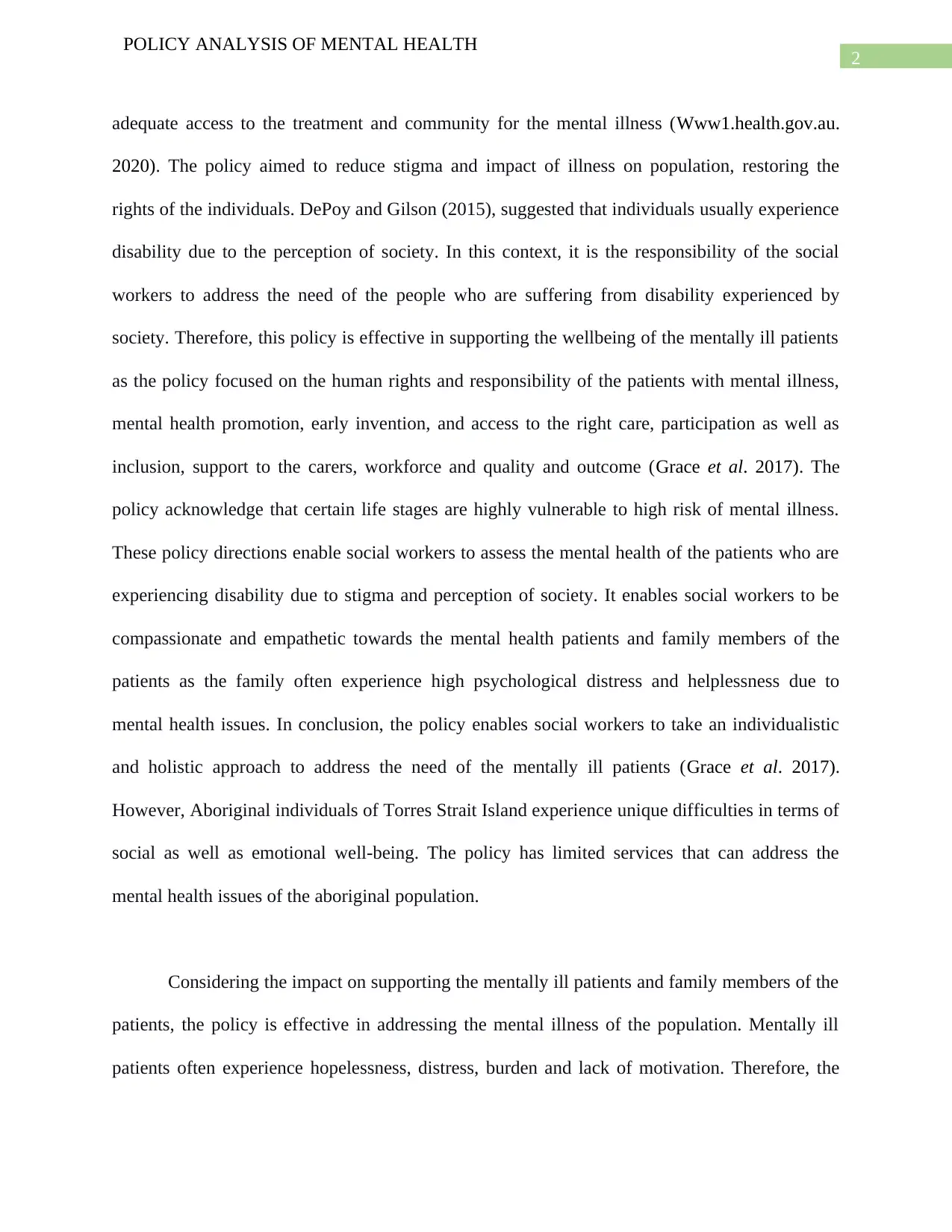
2
POLICY ANALYSIS OF MENTAL HEALTH
adequate access to the treatment and community for the mental illness (Www1.health.gov.au.
2020). The policy aimed to reduce stigma and impact of illness on population, restoring the
rights of the individuals. DePoy and Gilson (2015), suggested that individuals usually experience
disability due to the perception of society. In this context, it is the responsibility of the social
workers to address the need of the people who are suffering from disability experienced by
society. Therefore, this policy is effective in supporting the wellbeing of the mentally ill patients
as the policy focused on the human rights and responsibility of the patients with mental illness,
mental health promotion, early invention, and access to the right care, participation as well as
inclusion, support to the carers, workforce and quality and outcome (Grace et al. 2017). The
policy acknowledge that certain life stages are highly vulnerable to high risk of mental illness.
These policy directions enable social workers to assess the mental health of the patients who are
experiencing disability due to stigma and perception of society. It enables social workers to be
compassionate and empathetic towards the mental health patients and family members of the
patients as the family often experience high psychological distress and helplessness due to
mental health issues. In conclusion, the policy enables social workers to take an individualistic
and holistic approach to address the need of the mentally ill patients (Grace et al. 2017).
However, Aboriginal individuals of Torres Strait Island experience unique difficulties in terms of
social as well as emotional well-being. The policy has limited services that can address the
mental health issues of the aboriginal population.
Considering the impact on supporting the mentally ill patients and family members of the
patients, the policy is effective in addressing the mental illness of the population. Mentally ill
patients often experience hopelessness, distress, burden and lack of motivation. Therefore, the
POLICY ANALYSIS OF MENTAL HEALTH
adequate access to the treatment and community for the mental illness (Www1.health.gov.au.
2020). The policy aimed to reduce stigma and impact of illness on population, restoring the
rights of the individuals. DePoy and Gilson (2015), suggested that individuals usually experience
disability due to the perception of society. In this context, it is the responsibility of the social
workers to address the need of the people who are suffering from disability experienced by
society. Therefore, this policy is effective in supporting the wellbeing of the mentally ill patients
as the policy focused on the human rights and responsibility of the patients with mental illness,
mental health promotion, early invention, and access to the right care, participation as well as
inclusion, support to the carers, workforce and quality and outcome (Grace et al. 2017). The
policy acknowledge that certain life stages are highly vulnerable to high risk of mental illness.
These policy directions enable social workers to assess the mental health of the patients who are
experiencing disability due to stigma and perception of society. It enables social workers to be
compassionate and empathetic towards the mental health patients and family members of the
patients as the family often experience high psychological distress and helplessness due to
mental health issues. In conclusion, the policy enables social workers to take an individualistic
and holistic approach to address the need of the mentally ill patients (Grace et al. 2017).
However, Aboriginal individuals of Torres Strait Island experience unique difficulties in terms of
social as well as emotional well-being. The policy has limited services that can address the
mental health issues of the aboriginal population.
Considering the impact on supporting the mentally ill patients and family members of the
patients, the policy is effective in addressing the mental illness of the population. Mentally ill
patients often experience hopelessness, distress, burden and lack of motivation. Therefore, the
⊘ This is a preview!⊘
Do you want full access?
Subscribe today to unlock all pages.

Trusted by 1+ million students worldwide
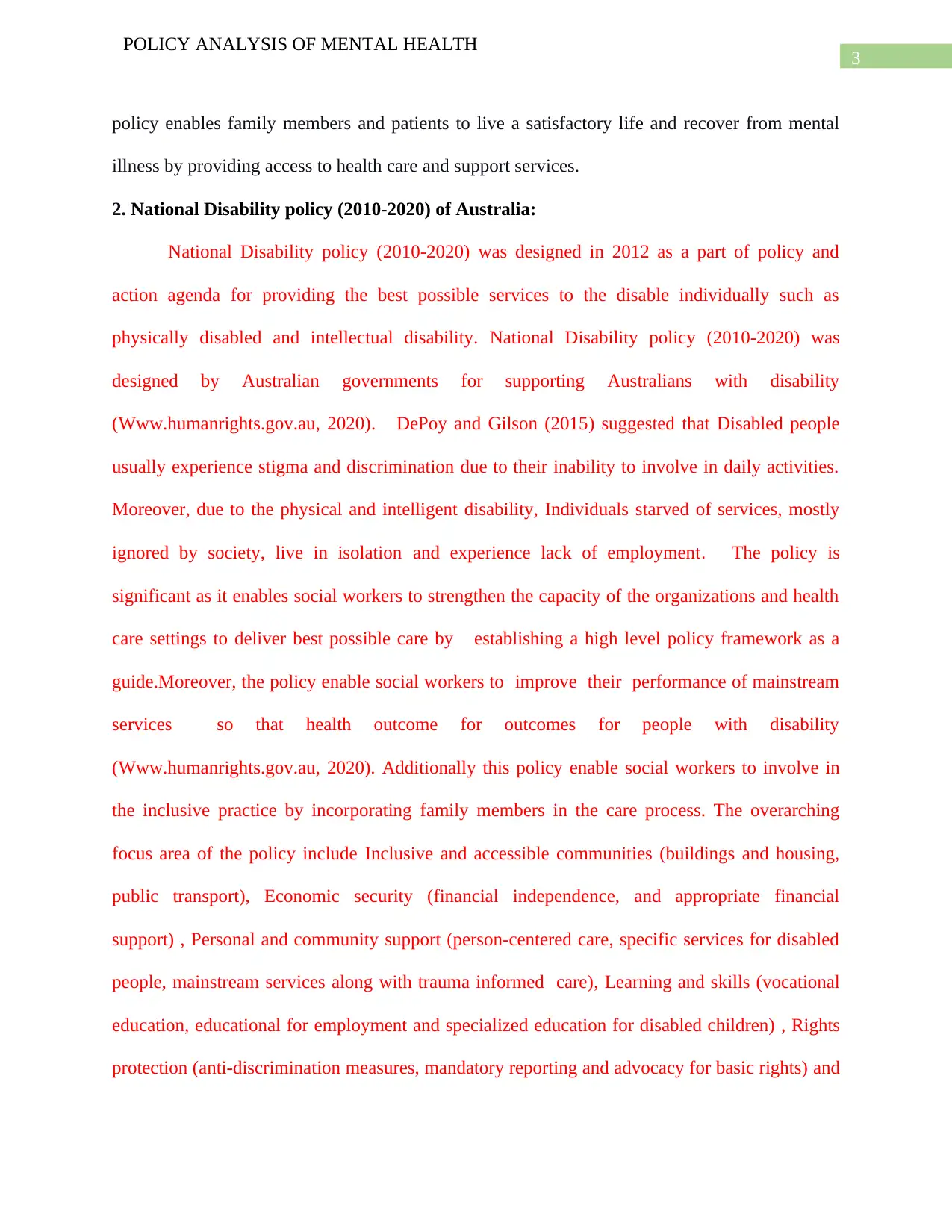
3
POLICY ANALYSIS OF MENTAL HEALTH
policy enables family members and patients to live a satisfactory life and recover from mental
illness by providing access to health care and support services.
2. National Disability policy (2010-2020) of Australia:
National Disability policy (2010-2020) was designed in 2012 as a part of policy and
action agenda for providing the best possible services to the disable individually such as
physically disabled and intellectual disability. National Disability policy (2010-2020) was
designed by Australian governments for supporting Australians with disability
(Www.humanrights.gov.au, 2020). DePoy and Gilson (2015) suggested that Disabled people
usually experience stigma and discrimination due to their inability to involve in daily activities.
Moreover, due to the physical and intelligent disability, Individuals starved of services, mostly
ignored by society, live in isolation and experience lack of employment. The policy is
significant as it enables social workers to strengthen the capacity of the organizations and health
care settings to deliver best possible care by establishing a high level policy framework as a
guide.Moreover, the policy enable social workers to improve their performance of mainstream
services so that health outcome for outcomes for people with disability
(Www.humanrights.gov.au, 2020). Additionally this policy enable social workers to involve in
the inclusive practice by incorporating family members in the care process. The overarching
focus area of the policy include Inclusive and accessible communities (buildings and housing,
public transport), Economic security (financial independence, and appropriate financial
support) , Personal and community support (person-centered care, specific services for disabled
people, mainstream services along with trauma informed care), Learning and skills (vocational
education, educational for employment and specialized education for disabled children) , Rights
protection (anti-discrimination measures, mandatory reporting and advocacy for basic rights) and
POLICY ANALYSIS OF MENTAL HEALTH
policy enables family members and patients to live a satisfactory life and recover from mental
illness by providing access to health care and support services.
2. National Disability policy (2010-2020) of Australia:
National Disability policy (2010-2020) was designed in 2012 as a part of policy and
action agenda for providing the best possible services to the disable individually such as
physically disabled and intellectual disability. National Disability policy (2010-2020) was
designed by Australian governments for supporting Australians with disability
(Www.humanrights.gov.au, 2020). DePoy and Gilson (2015) suggested that Disabled people
usually experience stigma and discrimination due to their inability to involve in daily activities.
Moreover, due to the physical and intelligent disability, Individuals starved of services, mostly
ignored by society, live in isolation and experience lack of employment. The policy is
significant as it enables social workers to strengthen the capacity of the organizations and health
care settings to deliver best possible care by establishing a high level policy framework as a
guide.Moreover, the policy enable social workers to improve their performance of mainstream
services so that health outcome for outcomes for people with disability
(Www.humanrights.gov.au, 2020). Additionally this policy enable social workers to involve in
the inclusive practice by incorporating family members in the care process. The overarching
focus area of the policy include Inclusive and accessible communities (buildings and housing,
public transport), Economic security (financial independence, and appropriate financial
support) , Personal and community support (person-centered care, specific services for disabled
people, mainstream services along with trauma informed care), Learning and skills (vocational
education, educational for employment and specialized education for disabled children) , Rights
protection (anti-discrimination measures, mandatory reporting and advocacy for basic rights) and
Paraphrase This Document
Need a fresh take? Get an instant paraphrase of this document with our AI Paraphraser
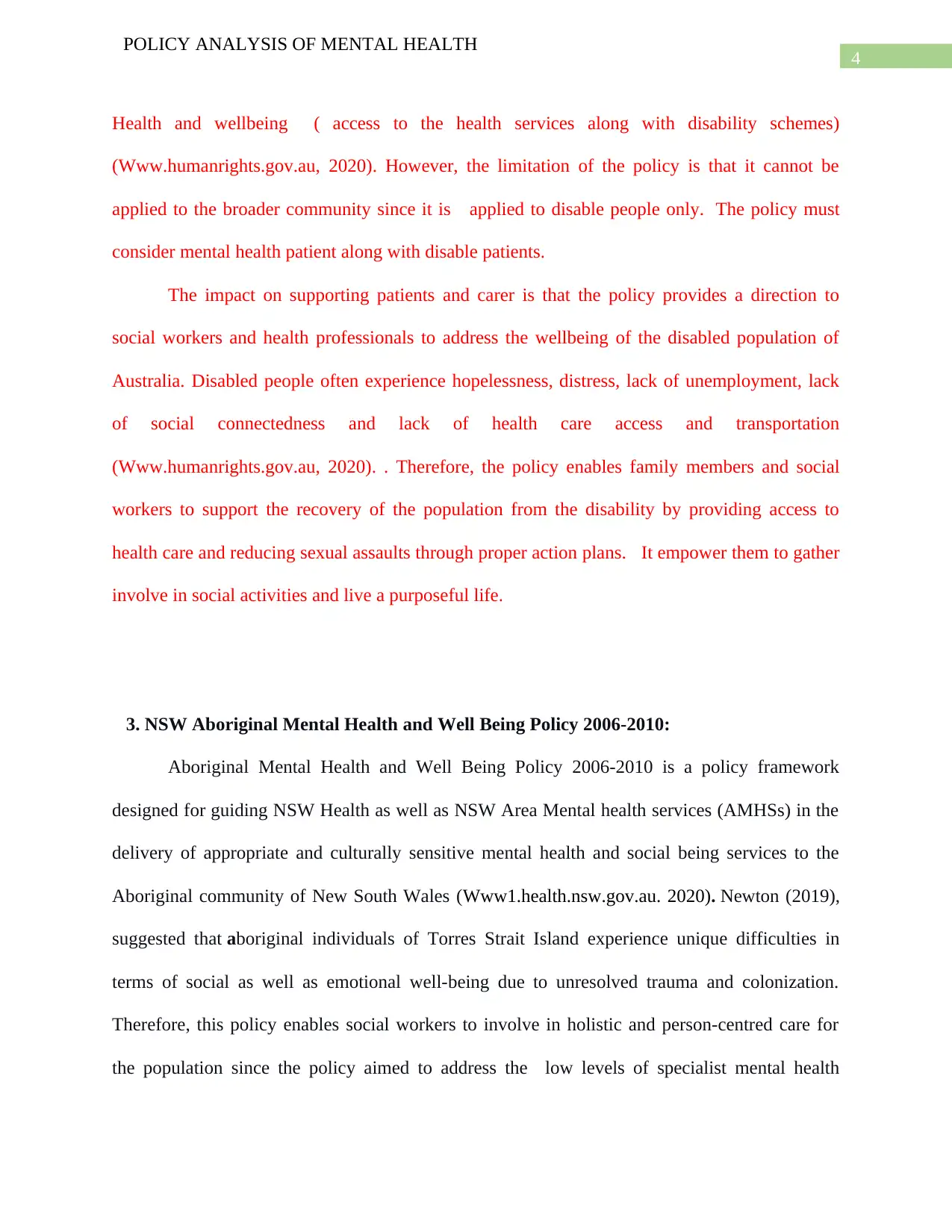
4
POLICY ANALYSIS OF MENTAL HEALTH
Health and wellbeing ( access to the health services along with disability schemes)
(Www.humanrights.gov.au, 2020). However, the limitation of the policy is that it cannot be
applied to the broader community since it is applied to disable people only. The policy must
consider mental health patient along with disable patients.
The impact on supporting patients and carer is that the policy provides a direction to
social workers and health professionals to address the wellbeing of the disabled population of
Australia. Disabled people often experience hopelessness, distress, lack of unemployment, lack
of social connectedness and lack of health care access and transportation
(Www.humanrights.gov.au, 2020). . Therefore, the policy enables family members and social
workers to support the recovery of the population from the disability by providing access to
health care and reducing sexual assaults through proper action plans. It empower them to gather
involve in social activities and live a purposeful life.
3. NSW Aboriginal Mental Health and Well Being Policy 2006-2010:
Aboriginal Mental Health and Well Being Policy 2006-2010 is a policy framework
designed for guiding NSW Health as well as NSW Area Mental health services (AMHSs) in the
delivery of appropriate and culturally sensitive mental health and social being services to the
Aboriginal community of New South Wales (Www1.health.nsw.gov.au. 2020). Newton (2019),
suggested that aboriginal individuals of Torres Strait Island experience unique difficulties in
terms of social as well as emotional well-being due to unresolved trauma and colonization.
Therefore, this policy enables social workers to involve in holistic and person-centred care for
the population since the policy aimed to address the low levels of specialist mental health
POLICY ANALYSIS OF MENTAL HEALTH
Health and wellbeing ( access to the health services along with disability schemes)
(Www.humanrights.gov.au, 2020). However, the limitation of the policy is that it cannot be
applied to the broader community since it is applied to disable people only. The policy must
consider mental health patient along with disable patients.
The impact on supporting patients and carer is that the policy provides a direction to
social workers and health professionals to address the wellbeing of the disabled population of
Australia. Disabled people often experience hopelessness, distress, lack of unemployment, lack
of social connectedness and lack of health care access and transportation
(Www.humanrights.gov.au, 2020). . Therefore, the policy enables family members and social
workers to support the recovery of the population from the disability by providing access to
health care and reducing sexual assaults through proper action plans. It empower them to gather
involve in social activities and live a purposeful life.
3. NSW Aboriginal Mental Health and Well Being Policy 2006-2010:
Aboriginal Mental Health and Well Being Policy 2006-2010 is a policy framework
designed for guiding NSW Health as well as NSW Area Mental health services (AMHSs) in the
delivery of appropriate and culturally sensitive mental health and social being services to the
Aboriginal community of New South Wales (Www1.health.nsw.gov.au. 2020). Newton (2019),
suggested that aboriginal individuals of Torres Strait Island experience unique difficulties in
terms of social as well as emotional well-being due to unresolved trauma and colonization.
Therefore, this policy enables social workers to involve in holistic and person-centred care for
the population since the policy aimed to address the low levels of specialist mental health
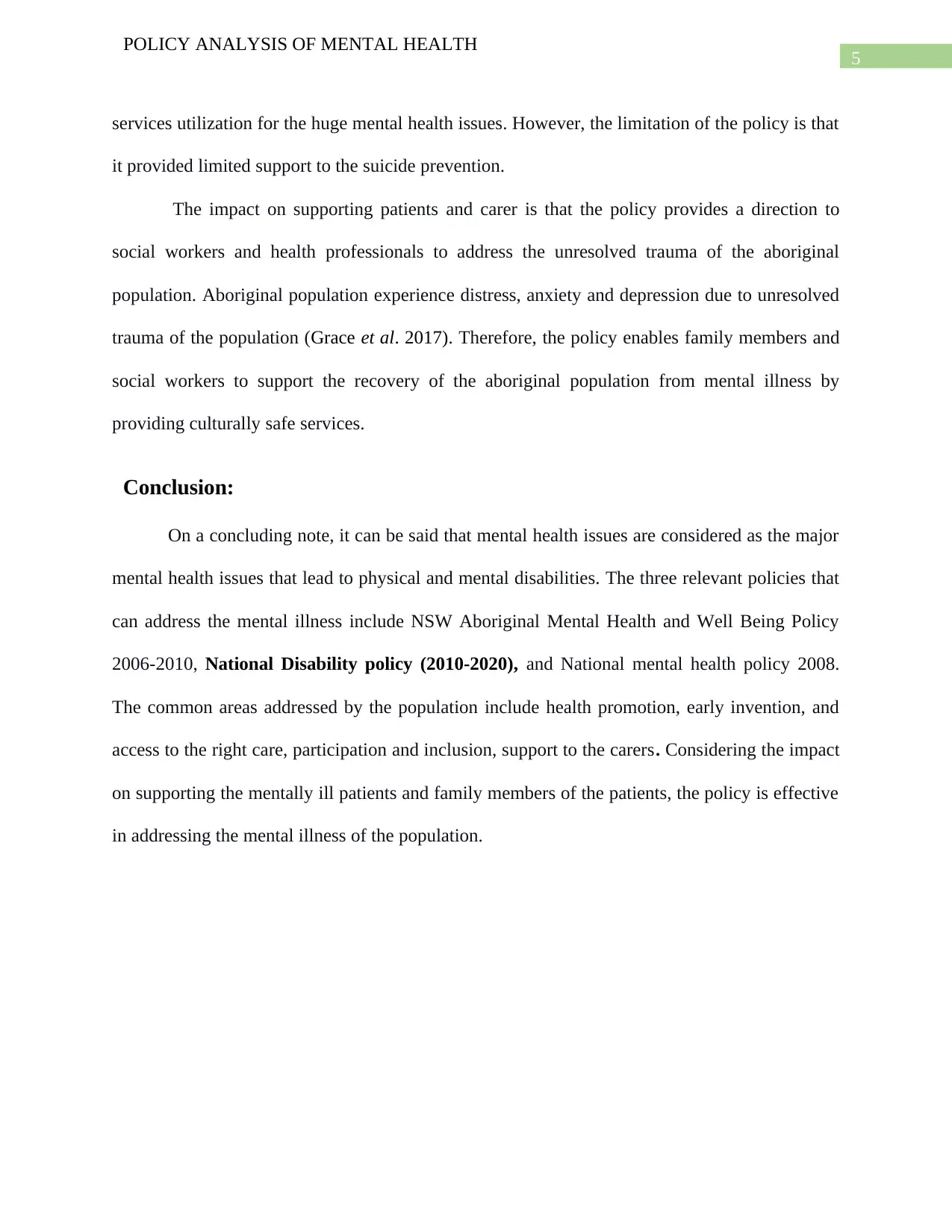
5
POLICY ANALYSIS OF MENTAL HEALTH
services utilization for the huge mental health issues. However, the limitation of the policy is that
it provided limited support to the suicide prevention.
The impact on supporting patients and carer is that the policy provides a direction to
social workers and health professionals to address the unresolved trauma of the aboriginal
population. Aboriginal population experience distress, anxiety and depression due to unresolved
trauma of the population (Grace et al. 2017). Therefore, the policy enables family members and
social workers to support the recovery of the aboriginal population from mental illness by
providing culturally safe services.
Conclusion:
On a concluding note, it can be said that mental health issues are considered as the major
mental health issues that lead to physical and mental disabilities. The three relevant policies that
can address the mental illness include NSW Aboriginal Mental Health and Well Being Policy
2006-2010, National Disability policy (2010-2020), and National mental health policy 2008.
The common areas addressed by the population include health promotion, early invention, and
access to the right care, participation and inclusion, support to the carers. Considering the impact
on supporting the mentally ill patients and family members of the patients, the policy is effective
in addressing the mental illness of the population.
POLICY ANALYSIS OF MENTAL HEALTH
services utilization for the huge mental health issues. However, the limitation of the policy is that
it provided limited support to the suicide prevention.
The impact on supporting patients and carer is that the policy provides a direction to
social workers and health professionals to address the unresolved trauma of the aboriginal
population. Aboriginal population experience distress, anxiety and depression due to unresolved
trauma of the population (Grace et al. 2017). Therefore, the policy enables family members and
social workers to support the recovery of the aboriginal population from mental illness by
providing culturally safe services.
Conclusion:
On a concluding note, it can be said that mental health issues are considered as the major
mental health issues that lead to physical and mental disabilities. The three relevant policies that
can address the mental illness include NSW Aboriginal Mental Health and Well Being Policy
2006-2010, National Disability policy (2010-2020), and National mental health policy 2008.
The common areas addressed by the population include health promotion, early invention, and
access to the right care, participation and inclusion, support to the carers. Considering the impact
on supporting the mentally ill patients and family members of the patients, the policy is effective
in addressing the mental illness of the population.
⊘ This is a preview!⊘
Do you want full access?
Subscribe today to unlock all pages.

Trusted by 1+ million students worldwide
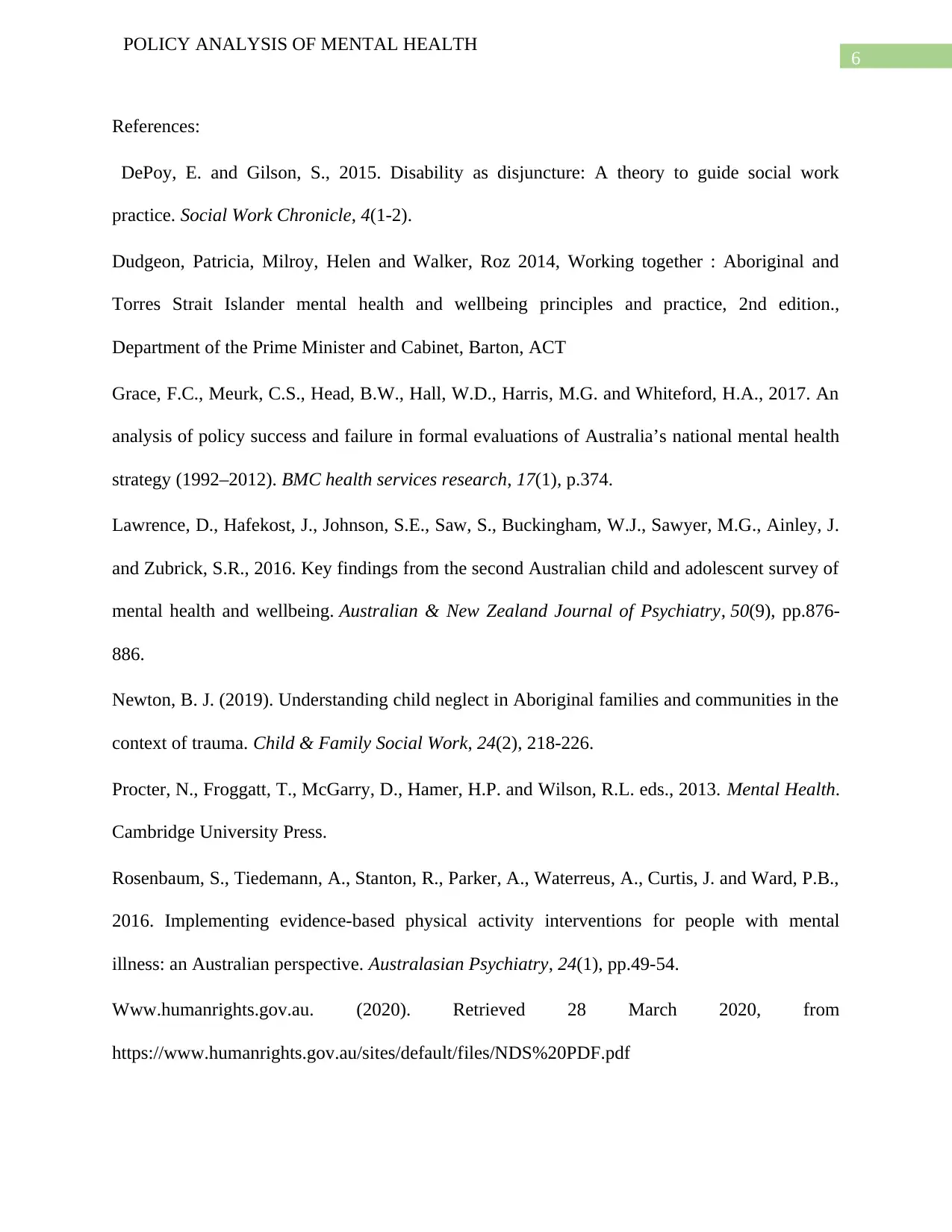
6
POLICY ANALYSIS OF MENTAL HEALTH
References:
DePoy, E. and Gilson, S., 2015. Disability as disjuncture: A theory to guide social work
practice. Social Work Chronicle, 4(1-2).
Dudgeon, Patricia, Milroy, Helen and Walker, Roz 2014, Working together : Aboriginal and
Torres Strait Islander mental health and wellbeing principles and practice, 2nd edition.,
Department of the Prime Minister and Cabinet, Barton, ACT
Grace, F.C., Meurk, C.S., Head, B.W., Hall, W.D., Harris, M.G. and Whiteford, H.A., 2017. An
analysis of policy success and failure in formal evaluations of Australia’s national mental health
strategy (1992–2012). BMC health services research, 17(1), p.374.
Lawrence, D., Hafekost, J., Johnson, S.E., Saw, S., Buckingham, W.J., Sawyer, M.G., Ainley, J.
and Zubrick, S.R., 2016. Key findings from the second Australian child and adolescent survey of
mental health and wellbeing. Australian & New Zealand Journal of Psychiatry, 50(9), pp.876-
886.
Newton, B. J. (2019). Understanding child neglect in Aboriginal families and communities in the
context of trauma. Child & Family Social Work, 24(2), 218-226.
Procter, N., Froggatt, T., McGarry, D., Hamer, H.P. and Wilson, R.L. eds., 2013. Mental Health.
Cambridge University Press.
Rosenbaum, S., Tiedemann, A., Stanton, R., Parker, A., Waterreus, A., Curtis, J. and Ward, P.B.,
2016. Implementing evidence-based physical activity interventions for people with mental
illness: an Australian perspective. Australasian Psychiatry, 24(1), pp.49-54.
Www.humanrights.gov.au. (2020). Retrieved 28 March 2020, from
https://www.humanrights.gov.au/sites/default/files/NDS%20PDF.pdf
POLICY ANALYSIS OF MENTAL HEALTH
References:
DePoy, E. and Gilson, S., 2015. Disability as disjuncture: A theory to guide social work
practice. Social Work Chronicle, 4(1-2).
Dudgeon, Patricia, Milroy, Helen and Walker, Roz 2014, Working together : Aboriginal and
Torres Strait Islander mental health and wellbeing principles and practice, 2nd edition.,
Department of the Prime Minister and Cabinet, Barton, ACT
Grace, F.C., Meurk, C.S., Head, B.W., Hall, W.D., Harris, M.G. and Whiteford, H.A., 2017. An
analysis of policy success and failure in formal evaluations of Australia’s national mental health
strategy (1992–2012). BMC health services research, 17(1), p.374.
Lawrence, D., Hafekost, J., Johnson, S.E., Saw, S., Buckingham, W.J., Sawyer, M.G., Ainley, J.
and Zubrick, S.R., 2016. Key findings from the second Australian child and adolescent survey of
mental health and wellbeing. Australian & New Zealand Journal of Psychiatry, 50(9), pp.876-
886.
Newton, B. J. (2019). Understanding child neglect in Aboriginal families and communities in the
context of trauma. Child & Family Social Work, 24(2), 218-226.
Procter, N., Froggatt, T., McGarry, D., Hamer, H.P. and Wilson, R.L. eds., 2013. Mental Health.
Cambridge University Press.
Rosenbaum, S., Tiedemann, A., Stanton, R., Parker, A., Waterreus, A., Curtis, J. and Ward, P.B.,
2016. Implementing evidence-based physical activity interventions for people with mental
illness: an Australian perspective. Australasian Psychiatry, 24(1), pp.49-54.
Www.humanrights.gov.au. (2020). Retrieved 28 March 2020, from
https://www.humanrights.gov.au/sites/default/files/NDS%20PDF.pdf
Paraphrase This Document
Need a fresh take? Get an instant paraphrase of this document with our AI Paraphraser
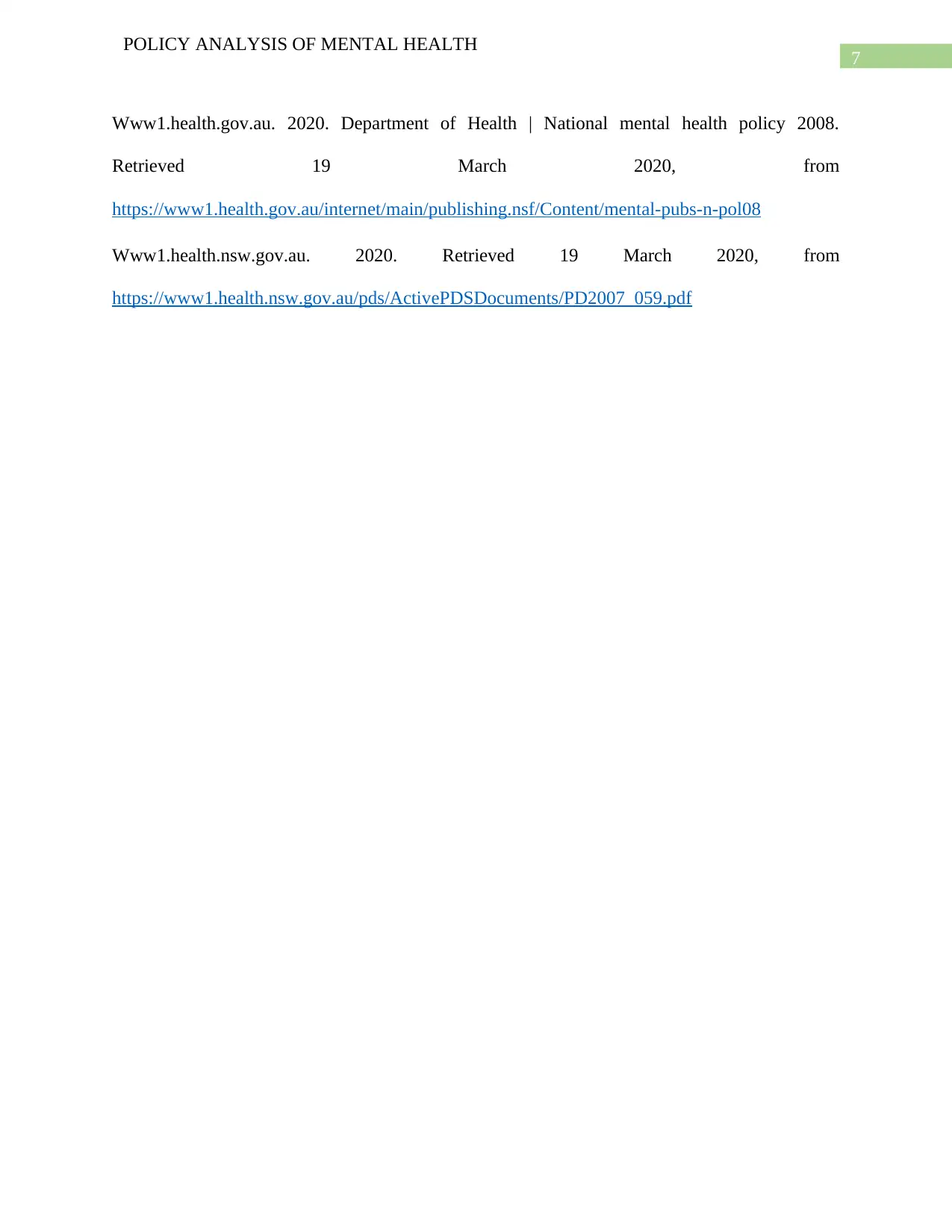
7
POLICY ANALYSIS OF MENTAL HEALTH
Www1.health.gov.au. 2020. Department of Health | National mental health policy 2008.
Retrieved 19 March 2020, from
https://www1.health.gov.au/internet/main/publishing.nsf/Content/mental-pubs-n-pol08
Www1.health.nsw.gov.au. 2020. Retrieved 19 March 2020, from
https://www1.health.nsw.gov.au/pds/ActivePDSDocuments/PD2007_059.pdf
POLICY ANALYSIS OF MENTAL HEALTH
Www1.health.gov.au. 2020. Department of Health | National mental health policy 2008.
Retrieved 19 March 2020, from
https://www1.health.gov.au/internet/main/publishing.nsf/Content/mental-pubs-n-pol08
Www1.health.nsw.gov.au. 2020. Retrieved 19 March 2020, from
https://www1.health.nsw.gov.au/pds/ActivePDSDocuments/PD2007_059.pdf
1 out of 8
Related Documents
Your All-in-One AI-Powered Toolkit for Academic Success.
+13062052269
info@desklib.com
Available 24*7 on WhatsApp / Email
![[object Object]](/_next/static/media/star-bottom.7253800d.svg)
Unlock your academic potential
Copyright © 2020–2026 A2Z Services. All Rights Reserved. Developed and managed by ZUCOL.





